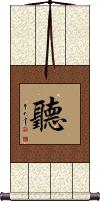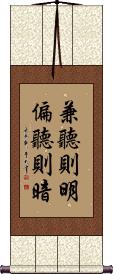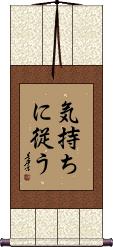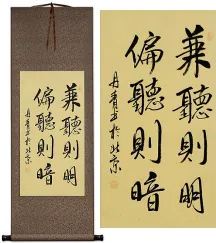Many custom options...
And formats...

Listen in Chinese / Japanese...
Buy a Listen calligraphy wall scroll here!
Personalize your custom “Listen” project by clicking the button next to your favorite “Listen” title below...
Listen
聽 means to listen, hear, and obey (depending on context).
聽 is a stand-alone word in Chinese but is usually seen in compound words in Korean. Therefore, this title is best for a Chinese audience.
![]() The ancient form of this character is shown in the upper left. However, there is a modern Japanese Kanji version shown to the right. If you want this modern Japanese version, please let us know when you place your order.
The ancient form of this character is shown in the upper left. However, there is a modern Japanese Kanji version shown to the right. If you want this modern Japanese version, please let us know when you place your order.
Listen to Both Sides and be Enlightened, Listen to One Side and be in the Dark
兼聽則明偏聽則暗 is an ancient Chinese proverb about getting all the information from all sides so that you truly understand a situation.

Wei Zheng
A man named Wei Zheng lived between 580-643 AD. He was a noble and wise historian and minister in the court of the early Tang Dynasty. The emperor once asked him, “What should an emperor do to understand the real-world situation, and what makes an emperor out-of-touch with reality?”
Wei Zheng replied, “Listen to both sides and you will be enlightened; listen to only one side and you will be left in the dark.”
Then Wei Zheng went on to cite examples of leaders in history that were victorious after heeding both sides of the story, and other leaders that met their doom because they believed one-sided stories which often came from flattering lips.
Please note that there is an unwritten rule when the same character appears twice in the same phrase, the calligrapher will alter the appearance so that no two characters are exactly alike in the same piece. This calligraphy has two repeating characters that will be written differently than they appear here.
Listen with Open Mind
Listen to Your Heart / Follow Your Heart
隨心而行 is the closest way to express this idea in Chinese. Literally translated, this phrase means “Allow your heart to dictate your behavior” or “Let your heart guide your conduct” in Chinese. You could also translate this as “follow your heart.” Or, with a bit of imagination, it could mean: “let your spirit be your guide.”
Note that in some cases, “heart” can mean “mind,” “soul” or even “spirit” in Chinese. In ancient China, it was thought that the big pumping organ in your chest was where your thoughts came from, or where your soul resides.
Ancient western thought followed a similar belief. Thus phrases like “I love you with all my heart” and “I give you my whole heart.”
Follow Your Heart
気持ちに従う is a Japanese phrase that means follow your heart.
The first part of this Japanese proverb means feeling, sensation, or mood.
The second part suggests the following, abiding by, or listening to this inner feeling.
In this context, you could say it means your heart, as the whole proverb suggests that you follow the feelings that you have inside.
Note: Because this selection contains some special Japanese Hiragana characters, it should be written by a Japanese calligrapher.
This in-stock artwork might be what you are looking for, and ships right away...
Gallery Price: $100.00
Your Price: $59.88
Gallery Price: $72.00
Your Price: $39.88
Not the results for Listen that you were looking for?
Below are some entries from our dictionary that may match your Listen search...
| Characters If shown, 2nd row is Simp. Chinese |
Pronunciation Romanization |
Simple Dictionary Definition |
聽 听 see styles |
tīng ting1 t`ing ting chō |
More info & calligraphy: ListenTo hear, listen, hearken; listen to, obey. |
十戒 see styles |
shí jiè shi2 jie4 shih chieh jukkai じゅっかい |
More info & calligraphy: Ten Commandments(1) (Buddhist term) the 10 precepts; (2) Ten Commandments; Decalogue; Decalog; (surname) Jukkai Śikṣāpada. The ten prohibitions (in Pāli form) consist of five commandments for the layman: (1) not to destroy life 不殺生 pāṇātipātāveramaṇi; (2) not to steal 不倫盜 adinnādānāver; (3) not to commit adultery 不婬慾 abrahmacaryaver.; (4) not to lie 不妄語musāvādāver.; (5) not to take intoxicating liquor 不飮酒 suramereyya-majjapamādaṭṭhānāver. Eight special commandments for laymen consist of the preceding five plus: (6) not to eat food out of regulated hours 不非時食 vikāla-bhojanāver.; (7) not to use garlands or perfumes 不著華鬘好香塗身 mālā- gandha-vilepana-dhāraṇa-maṇḍana-vibhūṣanaṭṭhānā; (8) not to sleep on high or broad beds (chastity) 不坐高廣大牀 uccāsayanā-mahāsayanā. The ten commandments for the monk are the preceding eight plus: (9) not to take part in singing, dancing, musical or theatrical performances, not to see or listen to such 不歌舞倡伎不往觀聽 nacca-gīta-vādita-visūkadassanāver.; (10) to refrain from acquiring uncoined or coined gold, or silver, or jewels 不得捉錢金銀寶物 jātarūpa-rajata-paṭīggahaṇāver. Under the Māhayāna these ten commands for the monk were changed, to accord with the new environment of the monk, to the following: not to kill, not to steal, to avoid all unchastity, not to lie, not to slander, not to insult, not to chatter, not to covet, not to give way to anger, to harbour no scepticism. |
虛己以聽 虚己以听 see styles |
xū jǐ yǐ tīng xu1 ji3 yi3 ting1 hsü chi i t`ing hsü chi i ting |
More info & calligraphy: Listen with Open Mind |
な see styles |
na な |
(particle) (1) (prohibitive; used with dictionary form verb) don't; (particle) (2) (imperative (from なさい); used with -masu stem of verb) do; (interjection) (3) (See なあ) hey; listen; you; (particle) (4) (when seeking confirmation, for emphasis, etc.; used at sentence end) now, ...; well, ...; I tell you!; you know; (particle) (5) (used to express admiration, emotionality, etc.; used at sentence end) wow; ooh |
ね see styles |
ne ね |
(particle) (1) indicates emphasis, agreement, request for confirmation, etc.; is it so; (interjection) (2) hey; come on; listen; (auxiliary adjective) (3) (colloquialism) not |
依 see styles |
yī yi1 i yori より |
to depend on; to comply with or listen to sb; according to; in the light of (female given name) Yori To depend, rely on; dependent, conditioned; accord with. |
聆 see styles |
líng ling2 ling rei / re れい |
(literary) to hear; to listen (given name) Rei |
これ see styles |
kore これ |
(interjection) (used to get the attention of one's equals or inferiors) hey; oi; come on; look; listen; (personal name) Kole; Kolle |
ねえ see styles |
nee ねえ |
(particle) (1) indicates emphasis, agreement, request for confirmation, etc.; is it so; (interjection) (2) hey; come on; listen; (auxiliary adjective) (3) (colloquialism) not |
ねね see styles |
nene ネネ |
(interjection) (See ね・2) hey; listen; (female given name) Nene |
側耳 侧耳 see styles |
cè ěr ce4 er3 ts`e erh tse erh |
to bend an ear (to); to listen |
傾耳 倾耳 see styles |
qīng ěr qing1 er3 ch`ing erh ching erh |
to prick up one's ear; to listen attentively |
傾聽 倾听 see styles |
qīng tīng qing1 ting1 ch`ing t`ing ching ting keichou / kecho けいちょう |
to listen attentively (out-dated kanji) (noun/participle) listening closely |
動聽 动听 see styles |
dòng tīng dong4 ting1 tung t`ing tung ting |
pleasant to listen to |
屬耳 属耳 see styles |
shǔ ěr shu3 er3 shu erh zokuni |
listen with full attention |
徹す see styles |
toosu とおす |
(transitive verb) (1) to stick through; to force through; (2) to spread throughout; to thoroughly diffuse; (3) to make a path between two points; (4) to proceed in a logical manner; (5) to let pass; to allow through; (6) to lead (someone) into (a house, room, etc.); to show in; (7) to go through (a middleman); (8) to (look, listen) through (a window, wall, etc.); (9) to pass (a law, applicant, etc.); (10) to force to accept; to force agreement; (11) to continue (in a state); to persist in; (12) to do to the entirety of; to cover all of; to span the whole ...; (13) to do from beginning to end without a break; (14) to convey (one's ideas, etc.) to the other party; (15) to do to the end; to carry through; to complete |
必聴 see styles |
hicchou / hiccho ひっちょう |
(noun - becomes adjective with の) must-listen |
愛聴 see styles |
aichou / aicho あいちょう |
(noun, transitive verb) loving listening to something; loving to listen to something |
拝聞 see styles |
haibun はいぶん |
(noun, transitive verb) hear; listen to |
掩耳 see styles |
yǎn ěr yan3 er3 yen erh |
to refuse to listen |
收聽 收听 see styles |
shōu tīng shou1 ting1 shou t`ing shou ting |
to listen to (a radio broadcast) |
来聴 see styles |
raichou / raicho らいちょう |
(n,vs,vt,vi) attendance; audience; coming to listen |
樂聽 乐听 see styles |
yào tīng yao4 ting1 yao t`ing yao ting gyōchō |
to listen intently |
監聽 监听 see styles |
jiān tīng jian1 ting1 chien t`ing chien ting |
to monitor; to listen in; to eavesdrop |
細聽 细听 see styles |
xì tīng xi4 ting1 hsi t`ing hsi ting |
to listen carefully (for tiny sounds) |
聆摻 聆掺 see styles |
líng shǎn ling2 shan3 ling shan ryōsen |
to listen and comprehend |
聆聽 聆听 see styles |
líng tīng ling2 ting1 ling t`ing ling ting |
to listen (respectfully) |
聞く see styles |
kiku きく |
(transitive verb) (1) to hear; (2) to listen (e.g. to music); (3) to ask; to enquire; to query; (4) to learn of; to hear about; (5) to follow (advice); to comply with; (6) to smell (esp. incense); to sample fragrance |
聞聲 闻声 see styles |
wén shēng wen2 sheng1 wen sheng monshō |
to listen to sounds |
聴く see styles |
kiku きく |
(transitive verb) (1) to hear; (2) to listen (e.g. to music); (3) to ask; to enquire; to query; (4) to learn of; to hear about; (5) to follow (advice); to comply with; (6) to smell (esp. incense); to sample fragrance |
Click here for more Listen results from our dictionary
The following table may be helpful for those studying Chinese or Japanese...
| Title | Characters | Romaji (Romanized Japanese) | Various forms of Romanized Chinese | |
| Listen | 聽 听 / 聴 | chou / ki / cho / ki | tīng / ting1 / ting | t`ing / ting |
| Listen to Both Sides and be Enlightened, Listen to One Side and be in the Dark | 兼聽則明偏聽則暗 兼听则明偏听则暗 | jiān tīng zé míng, piān tīng zé àn jian1 ting1 ze2 ming2, pian1 ting1 ze2 an4 jian ting ze ming, pian ting ze an | chien t`ing tse ming, p`ien t`ing tse an chien ting tse ming, pien ting tse an |
|
| Listen with Open Mind | 虛己以聽 虚己以听 | xū jǐ yǐ tīng xu1 ji3 yi3 ting1 xu ji yi ting xujiyiting | hsü chi i t`ing hsüchiiting hsü chi i ting |
|
| Listen to Your Heart Follow Your Heart | 隨心而行 随心而行 | suí xīn ér xíng sui2 xin1 er2 xing2 sui xin er xing suixinerxing | sui hsin erh hsing suihsinerhhsing |
|
| Follow Your Heart | 気持ちに従う | kimochi ni shitagau kimochinishitagau | ||
| In some entries above you will see that characters have different versions above and below a line. In these cases, the characters above the line are Traditional Chinese, while the ones below are Simplified Chinese. | ||||
Successful Chinese Character and Japanese Kanji calligraphy searches within the last few hours...











